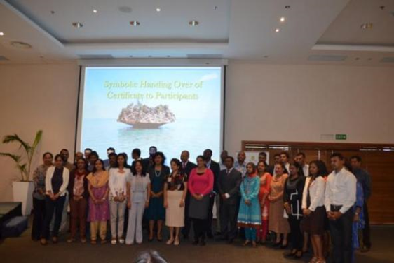-
- Promoting understanding of NAPs as outlined in UNFCCC/LEG Guidelines
- Providing technical expertise
- Offering opportunities for knowledge exchange.
As a party to the NAP-GSP process, GWPSA (through GWPO) supported two workshops in Malawi and Mauritius to start and help formulate and implement NAPs, and to build capacity on Cost Benefit Analysis of Coastal Management & Adaptation Options to Climate Change, respectively. These workshops were hosted by national governments and regional institutions, in collaboration with GWPSA, to support the local development of NAPs.
In Malawi, the support to the NAP process came in the form of the official launch of the NAP process in Malawi. The launch was in line with one of the decisions of the Sixteenth Session of the Conference of Parties of the United Nations Framework Convention on Climate Change. Malawi launched its National Adaptation Plan (NAP) on 2nd September at Sunbird Capital Hotel in Lilongwe. This was followed by a three day National Stakeholder Workshop at Sunbird Livingstonia Beach Hotel in Salima. The objective of the workshop was to assist the Government of Malawi identify the next steps in starting its National Adaptation Plan Process through multi-stakeholder engagement. The MWP Chair presented some remarks on behalf of GWP as one of the partners of the Global Support Programme Consortium.
In Mauritius, Global Water Partnership in collaboration with the Centre for Environmental Economics and Policy in Africa (CEEPA) – University of Pretoria and UNDP hosted a Short Course on Cost Benefit Analysis of Coastal Management & Adaptation Options to Climate Change from the 8th to the 12th of September 2014 at the University of Mauritius which brought together 38 participants. The training is offered under the Climate Change Adaptation Programme in the Coastal Zone of Mauritius, a training that aims to strengthen local institutional capacity through the training of technical staff of Governmental agencies and private sector stakeholders and the building of professional skills to climate change adaptation to the coastal zones of the Republic of Mauritius and to climate change financing to coastal adaptation measures. In this context, a Memorandum of Understanding was signed on the 22nd of May 2014 for long term collaboration with the University of Mauritius in view of ensuring the sustainability of the training component.
The closing ceremony at the training was also graced by the Mr. P. Jhugroo, Permanent Secretary of the Ministry of Environment and Sustainable Development (MoESD), Dr. P. Kurukulasuriya, Head of Climate Adaptation of UNDP, Mr. B. Larroquette, Regional Technical Advisor of UNDP/GEF, and Associate Professor, M. Nowbuth, Dean of Faculty of Ocean Studies.
As part of this programme, an online platform for a wide outreach and dissemination of the course materials has been made available by the University of Mauritius. Accordingly, the link to access the course material is as follows: http://lcms.uom.ac.mu/lms/course/view.php?id=585
The Malawian and Mauritius workshop participants developed recommendations relevant to their country’s national adaptation planning issues and status on next steps for moving forward to continue their NAPs. In Malawi, the workshop resulted in providing a platform to exchange knowledge and activities that are being implemented by various institutions in the country. It was highlighted that a lot of adaptation related activities are already taking place that could provide experiences and lesson learnt and inform the NAP process. Additionally, awareness was raised among stakeholders on the elements of the NAP process, where many participants indicated that they will develop sector and area specific concept notes to broaden the awareness in their specific areas of work. Participants also identified various entry points for NAP processes in their areas of work that indicated a need to undertake a compressive adaptation stock taking to advance the NAP process.
In mapping the way forward, participants in Mauritius noted that:
- A handbook on the rationale and techniques of cost benefit analysis to coastal adaptation options and coastal management is under production by UoM in collaboration with CEEPA.
- Collaboration is being sought with leading universities in the field of Coastal Engineering and Sciences to deliver short courses on Data Collection and Analysis.
- A regional conference on climate change adaptation is planned for 2015.
The governments of Malawi and Mauritius have formulated roadmaps and technical guidelines for furthering the NAP process and has begun to develop sector plans for water resources management. The workshops helped participants understand the process for developing a NAP for their respective countries, provided critical recommendations for next steps, and presented ways that regional organizations and institutions can provide needed support.
The successes from two workshops demonstrate that the NAP process works best when it is well- coordinated, integrated, and inclusive. Involving relevant ministries, different levels of government, and a broad range of stakeholders produces effective and inclusive policies.
